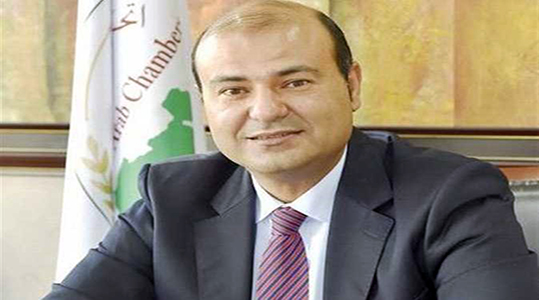The Secretary-General of the Union of Arab Chambers, Dr. Khaled Hanafy, stated that “the global system is facing an unprecedented storm today due to the Corona pandemic, in addition to the growth of economic nationalism and trade tensions,” pointing out that “expectations show a sharp decline in global foreign direct investment in 2020 and 2021, reaching a level of about 40% less than in 2019, which amounted to 1.54 trillion US dollars, while all countries of the world are expected to witness negative growth rates in foreign direct investment before the recovery in 2022.
Hanafy's words came during his participation in the activities of the 23rd Arab-German Business Forum, which was held virtually this year under the title: “Overcoming challenges together to build a better future - opportunities and vision, financing, investment and transfer of knowledge”.
In his speech at the fifth working session, which was held under the title: “Finance, Investment and Knowledge Transfer,” Hanafy affirmed that “everything is still unclear, as despite some positive indications, expectations remain largely uncertain, given that the outlook depends on the duration of the health crisis and the effectiveness of interventions’ policy to mitigate the economic impacts of the pandemic.
Hanafy said that "the Fourth Industrial Revolution represents the future of our society, as it emerges as a fundamental pillar in the global battle against COVID-19, where this revolution can be used to facilitate the movement of goods and services across borders, narrow the digital gap, and maximize the role of small and medium enterprises."
“The digital revolution is changing the traditional investment drivers and the determinants of knowledge transfer through 3 main technical directions: robotic automation, digitalization of the supply chain, and additive manufacturing,” he said.
He also explained that “the Arab region is a net importer and consumer of digital technology,” considering that “there are great opportunities to establish huge German-Arab investment partnerships in light of the Fourth Industrial Revolution,” stressing that “the expected impact of digital transformation on the economy of the Arab world is very large, as by 2030, the share of the digital economy in GDP growth in the Arab world is expected to exceed the 30 percent, which will support the growth and creation of millions of jobs and new businesses, directly and indirectly."
Hanafy considered that "investment in the green economy and the blue economy, as well as in infrastructure, would contribute to achieving the sustainable development goals," adding that "Arab-German cooperation in the field of investment in maritime transport is of vital importance."
He revealed that more than a third of the global FDI stock is in financial services, and most of it is in digital technologies, including new payment gateways, services using blockchain technology and big data-based intelligence.
Hanafy called for "the necessity to seize opportunities, as today there are promising opportunities for chambers of commerce in Germany and Arab countries, as well as for companies and businessmen, to positively exploit the current conditions and invest capital in rewarding job opportunities," stressing that "the current digital transformation has important implications for future investment strategies that need to facilitate the work of digital investors and create new forms of partnerships between Germany and the Arab world."

